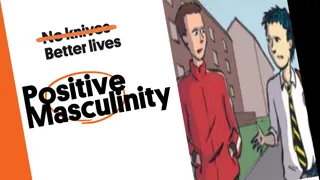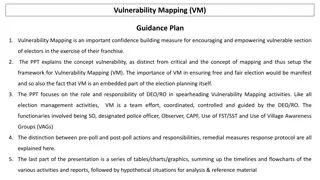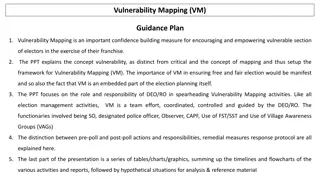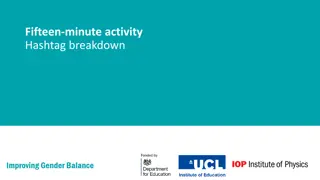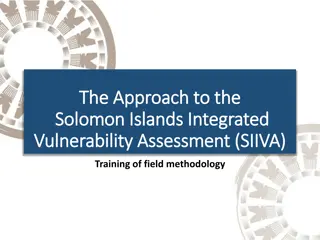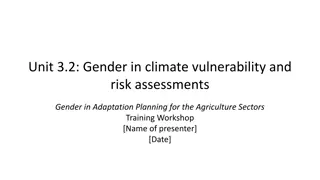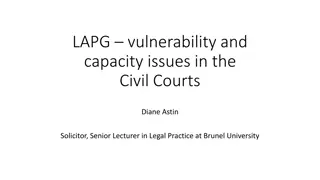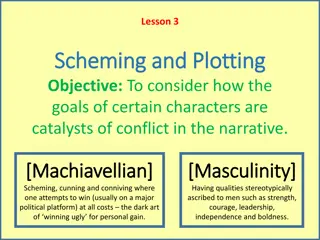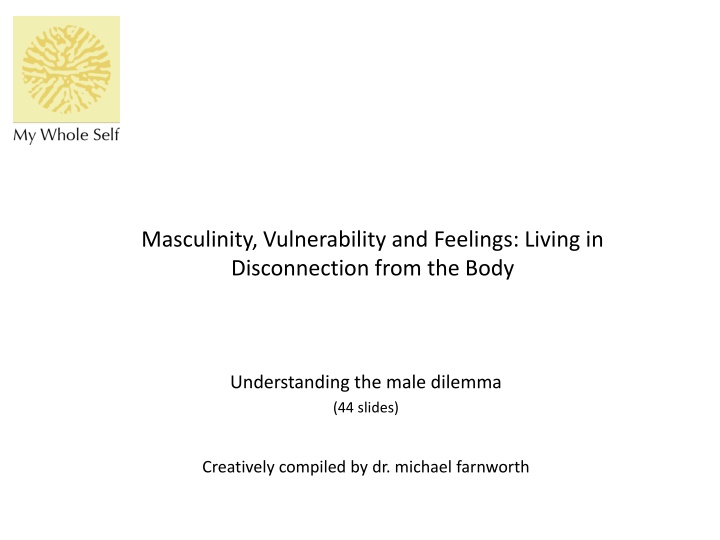
Masculinity and Male Vulnerability: A Cultural Exploration
Delve into the societal norms shaping male behavior and emotions, and how these impact mental health and relationships. Explore the disconnection between masculinity, vulnerability, and expressing feelings, offering insights into challenging existing paradigms.
Download Presentation

Please find below an Image/Link to download the presentation.
The content on the website is provided AS IS for your information and personal use only. It may not be sold, licensed, or shared on other websites without obtaining consent from the author. If you encounter any issues during the download, it is possible that the publisher has removed the file from their server.
You are allowed to download the files provided on this website for personal or commercial use, subject to the condition that they are used lawfully. All files are the property of their respective owners.
The content on the website is provided AS IS for your information and personal use only. It may not be sold, licensed, or shared on other websites without obtaining consent from the author.
E N D
Presentation Transcript
Masculinity, Vulnerability and Feelings: Living in Disconnection from the Body Understanding the male dilemma (44 slides) Creatively compiled by dr. michael farnworth
This is an excerpt from an incident from the boyhood life of J.E. Faust (after he shot himself in the leg with his .22 caliber rifle) on a varmint hunting trip: After laying me on the operating table and examining the wound carefully, the doctor decided that he must first sterilize the hole in my leg through which the bullet had passed. When I saw how he was going to sterilize it, I was afraid of two things: I was afraid of the pain and I was also afraid that I would cry. I didn t want to cry, because I wanted my father to think I was no longer a child.
This lesson will be the attempt to explore the cultural reality in which males are socialized to embrace. This masculine socialization process has well known consequences that have unhealthy results that end in early death, high suicide rates, unhappy marriages and addictive states revolving around mood altering substances and activities.
This lesson is based upon the assumption that men are, by nature, inclined to engage life in a meaningful way which includes the emotions, feelings and energies that are part and parcel of their genetic blueprint that they have received from Life. When the culture deadens or attempts to remove the inner connections of that blueprint (i.e. feelings, energies and emotions) males will suffer the psychological violence of the disconnect.
This lesson is not to blame males but rather to help enlighten us to the forces at work that seduces and does violence to the male who is socialized by the values and paradigms of the present culture and offer an alternative.
The socialization of the environment has consequences, many of them unintended.
To be a successful male in this culture one has to learn how to compete and win. This winning attitude begins very early with competitive sports and later extends to academics, dating beautiful females, education, marriage, business and making money. If a male cannot compete well he will not be considered a success.
From an early age males are taught to keep their feelings to themselves. Explicit (clearly stated) messages of don t cry, don t be a baby, stop being scared, you re not hurt, be a big boy, are pervasive and powerful because they carry a very powerful implicit (not clearly stated) message of: as far as we are concerned, you are only acceptable and lovable if you act and behave in certain ways.
Every young child craves to be loved and accepted and will learn very quickly the cultural and parental expectations of what has to happen for them to receive this love and acceptance. This process is called enculturation and is powerful and long lasting because it reinforces the brain in the necessary survival behaviors.
Enculturation is essentially survival behavior for the young child. They will mirror and model the behavior that is most beneficial for their pleasing of the people in charge of their life namely their mother and father. And if that mother and father are asleep to the values of the enculturation agenda (especially of gender appropriate behavior) then they will pass on to their little boys the values and paradigms that support and propagate the culture.
The one idea that I want to introduce in this first sections is the reality that many males are abused and traumatized when they are young. I am talking about physical abuse, emotional abuse, sexual abuse and being treated in inhumane, aloof and hardened ways. All according to the dictates of a culture that teaches males that is a hard world out there so you might as well get use to it!
What if there were a connection between the treatment of young infant and childhood males and the later adult male behavior of work, sex and sports addiction, domestic violence and men who are detached and aloof from intimate relationships of the marriage and family? I would think that would be an important connection to explore and understand.
It seems to be well accepted that parents and adults will hold infant males less and will be less nurturing and loving to them according to the cultural notion that males do not need as much nurturing as female infants. These early childhood experiences, with these intended emotional deprivations, have a negative impact upon the male personality development.
Model Imperatives Nature needs modeling of specific behaviors to genetically trigger the blueprint of the brain. This modeling has to occur by human adults that have already achieved that state themselves. Children cannot be raised by other children that have not attainted this development themselves. A mature adult that safely models and triggers the same in the child, is needed. It is a model imperative for brain development in children, otherwise the synaptic connections will never be made.
That nurture is necessary to trigger the nature. (we are talking about the Model Imperative ) For example The easiest and quickest way to induce depression and alienation in an infant or child is not to touch it, hold it, or carry it on your body. James W. Prescott
What we are talking about here is a neurobiological process of triggered brain development brought about by the model imperative of safe, loving and nurturing parents. If these kinds of parents are not present but are rather culturally seduced by the notion that baby boys need to be toughened up then the model imperatives of neglect (in the form of letting them cry for long periods of time, being less attentive to their feelings, needs and wants) will create a male child who will neglect his own energies and emotions based upon the model imperative. We are talking brain structure not philosophical ideas about raising children.
Since we each are unique and one of a kind can any of us guess the impact upon our personality development that can be triggered by early life experiences that may be counter to our natures and identities?
Most of us, when we think of trauma we think of an event like physical, sexual or emotional abuse. We think of accidents and situations that envelop the person in stress, loss and victimization. We typically don t think of long term processes that put the child in a constant state of anxiety, threat, neglect or fear. This is know as process trauma and it is just as debilitating and destructive to the child s personality and later adult behavior.
Post Traumatic Stress Syndrome: Post traumatic stress syndrome was first seriously addressed when Vietnam Veterans came home and suffered psychological dysfunction from flash backs and an inability to integrate what they had experienced via war into their lives. These traumatic experiences have been taken seriously by a culture who ignored them for years. I want to explore the issue of process trauma in young male children.
Alice miller begins her book, TheDRAMA OF THE GIFTED CHILD with... We live in a culture that encourages us not to take our own suffering seriously, but rather to make light of it or even to laugh about it many are proud of their lack of sensitivity toward their own fate and particularly toward their fate as a child. (this is no more true than in relationship to males)
The Ultimate Irony In the developing brain, (i.e. infancy and childhood) neurotransmitters and hormones play key roles in neuronal migration, differentiation, synaptic proliferation and overall brain development. (J. Lauder, Progress in Brain Research 73, 1988.) The very time when humans are most vulnerable to the effects of trauma and stress (i.e. infancy and childhood) most adults assume the most resilience and minimize the possible consequences.
The most sensitive and sophisticated sensing miracle of the Central Nervous System The central nervous system of a human being is a wonder of neural, chemical, hormonal communication and feedback. What ignorance we possess to think that children are basically unaffected (not to worry) by early trauma and stress experiences. These events, when of sufficient duration, intensity and frequency can change brain function and brain mediated responses!
Male children are often exposed to harshness in the hopes of getting them ready for the real world In large measure the harshness that characterizes so much of our society is an outgrowth of the harshness imposed upon children years ago G. B. Hinckley
This process of childhood trauma and abuse results in sanctuary trauma that forces the child to leave their inner places of the heart for the outer approval and acceptance of well meaning others. This original disconnect from themselves is the beginning of emotional awareness and affect control problems.
Affect regulation Affect regulation is the psychological term for control of emotions and feelings: anger, rage, fear, paranoia, desire, affection, attachment, etc. Children and adults who are low in affect regulation have a very difficult time in this culture and in relationships. Abuse, threat and stressors in childhood inhibit the neurological connections between the old and new brain that are a prerequisite to affect regulation!
Said another way, if a child has been abused, neglected, traumatized in infancy and childhood then as an adult they will have problems controlling their emotions! The childhood synaptic brain connections of the old brain will override the new brain cognitive attempts at control.
Since most adults are disconnected and cant remember their own histories as children it is important at least to consider the emotional, neurological impact of trauma and abuse on young infants and children even if the culture at large considers it a non issue!
Children of trauma and abuse can suffer the effects of Post Traumatic Stress Syndrome for years Memory loss (explicit) Emotional swings Sleep disorders Sexual disorders Relationship withdrawal Regressive childlike behavior Loss of belief in meaningful life Coordination deficit
The effects of post traumatic stress can create a subtle feeling of being under a constant state of threat. The person will often become hyper vigilant and feel as if they could be in trouble or lose control at any time. This sense of instability is very wearing over time.
This sense of being out of control will eventually be met with either emotional shut down and disconnect (which fits in very well with the silent, sturdy in control male) or will be met with mood altering behaviors and activities (drinking, sexual acting out, sports, work) that create an eventual addictive prison towards whatever helped him feel more in control of himself and in charge of the situation.
Clyde was a United States Marine veteran who almost been killed by friendly fire on three separate occasions during his stay in Vietnam. He once was buried alive and left for dead by his buddies, another time was the sole survivor of an artillery round falling short that killed his whole platoon, and survived another horrific event where, not only was the enemy trying to kill him, but his friends almost did too! Dispatched to the back war before I met him, he was maintained on seven different medications, married to a lovely co-dependent woman and having trouble sleeping. As he sat trembling, rocking and shaking in my office, I asked him how he relaxed. He answered by saying that if the voices and noises in the night go too intense, he would do the following: reach under the bed, take out his M-16, put a round in the chamber, place the muzzle in his mouth with his finger on the trigger, then release the safety. Only them could her relax! All this while his wife slept soundly next to him and his children slept nearby in another room. His reasoning was simple he now had control over events, he was master of his own destiny, and he could stop the intolerable fear and pain. Thomas Hedlund, Overcoming Roadblocks to Recovery , The Meadows, Spring 2004, The Cutting Edge
Addiction can become the solution for the sense of instability and threat that interlaces their life. Addictions can bring them temporary relief from the onslaught of energies and emotions that haunt them. Addictions can save them from the feelings left over from childhood trauma and wounds.
the real cause of addiction/stress is what we learn about ourselves and our feelings as children. It s about violence, the pain of neglect, the losses and traumas of our childhood. Addiction comes from despair. Terry Kellogg, Broken Toys- Broken Dreams p. 79
The addictive stance of our current American culture is overwhelming. Just think of all the addictive activities, processes, relationships and substances that symbolize our degraded state of life.
Addiction anyone? Alcohol Smoking Pornography Sexual Affairs Gambling Work Sports Religion Media: TV, Music Video Games Computer Surfing Money Control and Power Ideologies Drugs (street and prescription) Food
Addictions mood alter Any activity, process, substance, cause, person, sensation: can become addictive in nature. The purpose of the addiction is to numb us to our pain or allow us to feel, if we are shut down.
Intimacy is the act of sharing feelings and energies... Intimacy is the process of being spiritually known by another. If addictions are used to disguise or to hide from our energies then they prevent intimacy with yourself and others. This is an important connection to make!
Characteristics of the addict: 1. Dishonest by not naming and lying about the addictive agents. 2. Grandiose by believing themselves to be the exception and not being effected. 3. Control freak by obsessing about behavior and surrounding themselves with enablers. 4. Perfectionist by rational, logical, self centered control of self.
This addictive over-tangle that is present in our culture is an unintended consequence of the spiritual disconnect with our own selves. When our spiritual moorings are displaced then people will attempt to recreate the spiritual with the secular. It has been said that addictions are a home grown religion that attempts to put us back in touch with the rapture of being truly alive.
Now if things were not complicated enough males are confronted with the notion that anything tender, sensitive, gentle, sweet, or soft of an emotional nature is strictly feminine and should be avoided like the plague! Hence, we have males actively suppressing meek, gentle and compassionate energies in themselves in the attempt to prove themselves masculine and strong.
I think it is important to be able to see how this society punishes and demeans males who express a vulnerable, soft side of themselves- they are seen and labeled as weird, queer, fags, homos and girlie men . And so it goes




